Introduction by Christopher Todd
Body and participant data by Cyndee McManaman,
CT History Day Regional Coordinator
Connecticut History Day Celebrates 50th Anniversary in Storrs
On a beautiful Saturday in early March, more than 300 students accompanied by family, friends, and educators descended upon UConn’s Storrs Campus to participate in the Connecticut History Day’s Mansfield/Storrs Regional Contest. Organized by the Connecticut Democracy Center, in partnership with the Department of History at UConn, as well as UConn’s Office of Early College Programs, Connecticut History Day (CHD) built upon the program’s legacy of success. Students tackled this year’s theme, “Turning Points in History”, bringing to life the ideas, topics, and actions that directly and/or indirectly brought about change.
Connecticut History Day
Connecticut History Day (CHD) is an affiliate program of National History Day (NHD) which annually engages nearly 5,000 middle and high school students in historical research, interpretation, and creative expression through project-based learning. As stated by the CHD, the program seeks to bring students, teachers, museums, and scholars together to support young people as they engage in history. Led by the Connecticut Democracy Center, CHD is presented with major funding and partnership support from CT Humanities.
CHD offers a wide array of free resources for teachers and students to assist them with the History Day process,
including: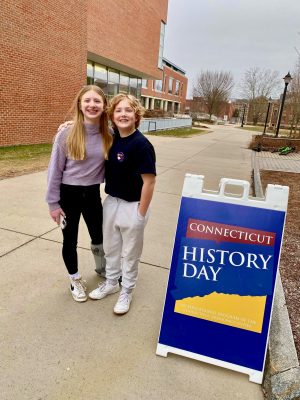
• Teacher Handbook (English and Spanish)
• Student Handbook (English and Spanish)
• Educator Workshops
• In-class student workshops
• Digital resources for research and writing
Mansfield/Storrs Regional Competition
Throughout the Northeastern Connecticut Region, 32 teachers representing 27 schools brought History Day into their classrooms during the 2023-2024 school year. The Northeastern region supported 868 of the statewide 4,392 school-level participants, with 272 students attending the Mansfield/Storrs Regional Contest at UConn on Saturday, March 2nd. In all, CHD held 5 regional contests around the state with the state contest held at Central Connecticut State University (CCSU) on May 4th. The Mansfield Region was strong and represented a large portion of the medals and special prizes awarded: 23 entries won medals (first, second, or third place) with 18 of those qualifying for the National Contest, and 6 entries received special prizes. At the National Contest, held at the University of Maryland-College Park campus June 9-13, 2024, students from the Mansfield region shined. The following students received medals, special prizes, or honorable mention for their entries:
- Maura Armstrong & Teagan Dieterle (Ellington High School): 1st Place overall for their Senior Group Documentary The Creation of Sesame Street: A Turning Point in Educational History
- Julianne Pashe & Katie Smith (Ellington Center School): Outstanding CT Entry, ranking 4th overall, for their Junior Group Exhibit The Capitol Crawl: A Climb for Disability Equality and the Push for ADA
- Ishanvi Mahopatra (Timothy Edwards Middle School): ranking 8th overall for her Junior Individual Documentary William T.G. Morton’s Ether Day: A Turning Point in Surgical History
- Aarush Kalia (South Windsor High School): Outstanding CT Entry, ranking 10th overall, for his Senior Individual Documentary The Great Swamp Fight: The Battle That Transformed American History
- Aaron Aldrin (Timothy Edwards Middle School): received the Discovery or Exploration Special Prize for his Junior Individual Website Cogito Ergo Sum: Rene Descartes’ Cartesian Revelation (5th place overall)
The following students’ entries received Honorable Mention (each of these projects placed second in their judging room for the preliminary round of project evaluation):
- Emmett Smith (Ellington High School): Senior Individual Exhibit A Battle of Rights for the Incarcerated: The Legacy of the Attica Prison Riot. Emmett’s entry also represented CT in the National History Day Exhibit Showcase at the Smithsonian Museum of American History.
- Andrew Doyle & Avishkar Kasiliya (John F. Kennedy Middle School): Junior Group Website Stalingrad: How the Triumph of the Red Army Turned the Tide of War in the East
- Enaaya Mohammad & Musfira Bhuiyan (Madina Academy): Junior Group Website The History and Evolution of the Smallpox Vaccine
- Bhaavni Krishna (South Windsor High School): Senior Individual Performance From Protest to Progress: Helena Hill Weed and the Birth of a New Activist Movement
- Kalyani Tihaiya, Kayla Lin & Mia Chen (E.O. Smith High School): Senior Group Performance From Asian Exclusion to Inclusion: The Immigration and Nationality Act of 1965
Comment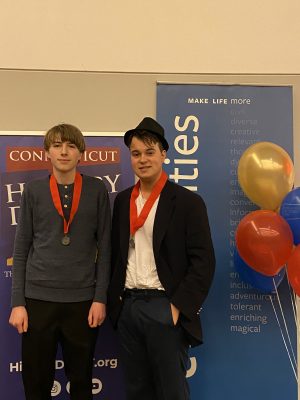 s from students at the Mansfield Regional Contest:
s from students at the Mansfield Regional Contest:
“I decided to participate in CT History Day because it will help me learn how to do research better and will help me grow as a learner and it will be fun to present all my hard work. I will also get to try something new.” (middle school student)
“I decided to participate in CT History Day to explore historical events and innovations in further depth than I have traditionally in classes and gain new insight on how they have affected the present day.” (high school student)
Comments from parents at the Mansfield Regional Contest:
“This is my daughter’s 6th year competing. History day has been the single most influential factor in her personal and academic growth; from her writing and research skills to the confidence she now has when presenting or speaking. “
“This whole experience with National History Day has taught my children to care about people whose experiences are different from theirs. They are looking around the world with a critical eye to what these events mean, how they affect people, and what we can do about it. I love that!”
Comments from teachers at the Mansfield Regional Contest:
Juanita Richardson, Carmen Arace Middle School, Bloomfield CT: “This year was my first time coaching students through the History Day process. There was a lot to learn and consider, but between the coordinators and the website, I felt confident that my students had the tools to be successful. I’m very proud of my students for taking on this new, unfamiliar opportunity. Not only did they place Top 3 at the Regional Contest for junior exhibits, but they also learned invaluable skills that they are carrying with them into high school next year!”
Matthew Sivo, E.O. Smith High School, Storrs, CT: “History Day helps students build more social awareness and historical empathy and also furthers their understanding of their civic duties and other communities.” 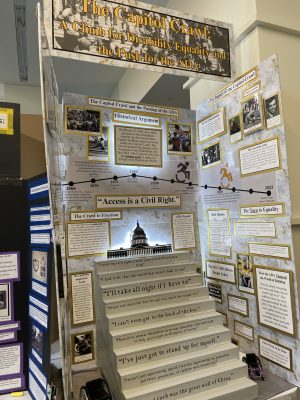
Comments from judges at the Mansfield Regional Contest:
“Every year I leave the History Day contest impressed by the enthusiasm for learning shown by the History Day students. I love seeing what students choose as topics. The in-depth research and analysis that these students do to complete their projects requires perseverance and dedication. History Day is a special day!”
“At this past year’s Mansfield, Connecticut, History Day regional competition, I was so pleased to see such good work in the senior papers that I and my co-judges read, as well as the diversity of participants and their topics, and the enthusiasm among the students. The quality of research and writing was remarkably good overall, and outstanding in some cases. And the diversity of student topics was impressive, ranging from war and politics to biography and popular culture, and across different societies all over the world. Most importantly, the students were quite enthusiastic about their papers, which they readily shared with each other in a seminar including all paper writers at the end of the competition. Several parents attended the seminar, and they were enthusiastic, too. As we co-judges left the seminar, a father and son stopped and thanked us for the opportunity to allow the son to present in a rigorous competition on his interests. It was great to witness such enthusiasm for history and good historical work.”
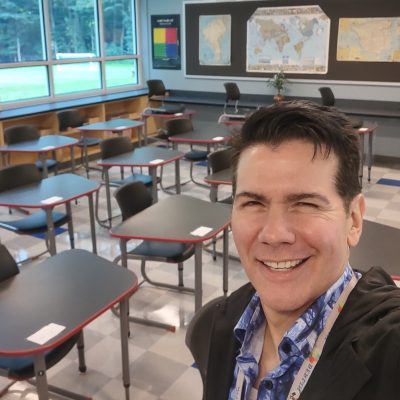 Conversation: Cultural Topics, since 2012. His unique gift to ECE classrooms was bringing alive the language, culture, and history through his storytelling based on his extensive travel experiences in the Hispanic and Portuguese worlds, and his Chilean heritage. In his retirement, Mr. Lewis will move on to his third career teaching Buddhist philosophy and practice, and eventually living part time in the White Mountains and in Chile.
Conversation: Cultural Topics, since 2012. His unique gift to ECE classrooms was bringing alive the language, culture, and history through his storytelling based on his extensive travel experiences in the Hispanic and Portuguese worlds, and his Chilean heritage. In his retirement, Mr. Lewis will move on to his third career teaching Buddhist philosophy and practice, and eventually living part time in the White Mountains and in Chile.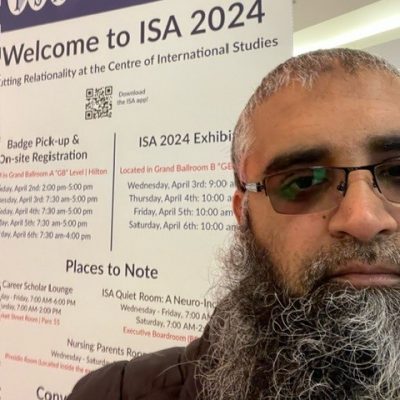 International Studies Association Annual Conference in San Francisco, CA in April, where he presented a research paper on Nationalism and identities in South Asia, an article version of his dissertation. He also co-presented on forming national identities, mass culture, and land rights. Dr. Rafiq was able to attend several sessions, including foreign policies, using role theory and Arab Spring 2.0, and civil war research.
International Studies Association Annual Conference in San Francisco, CA in April, where he presented a research paper on Nationalism and identities in South Asia, an article version of his dissertation. He also co-presented on forming national identities, mass culture, and land rights. Dr. Rafiq was able to attend several sessions, including foreign policies, using role theory and Arab Spring 2.0, and civil war research.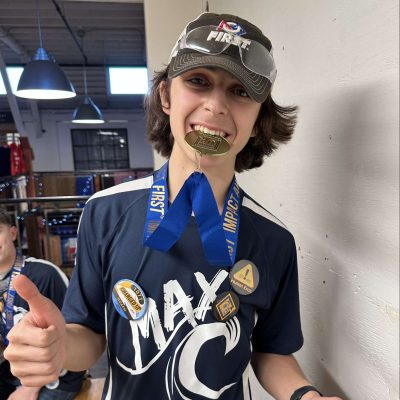
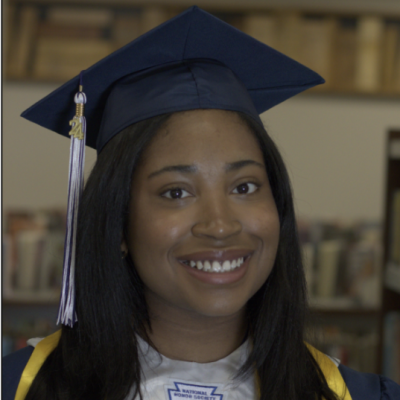
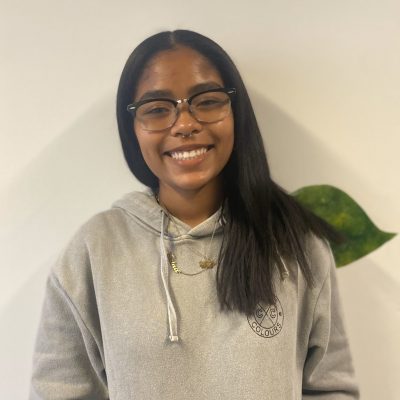
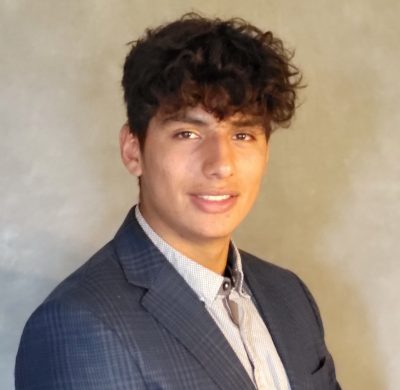
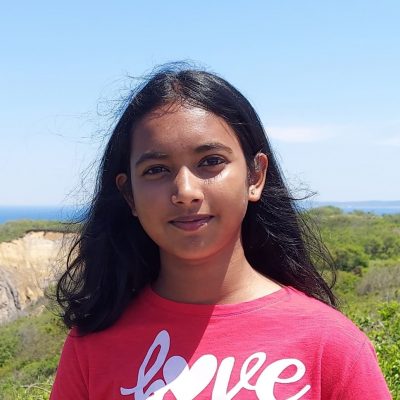
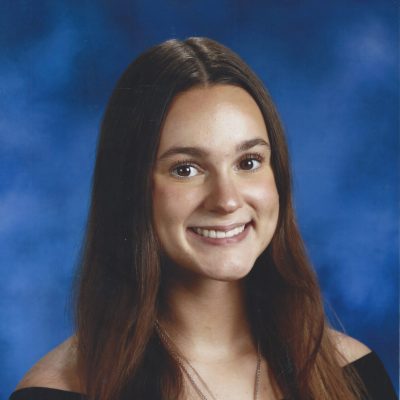
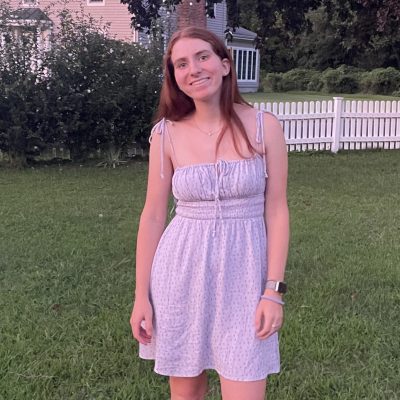
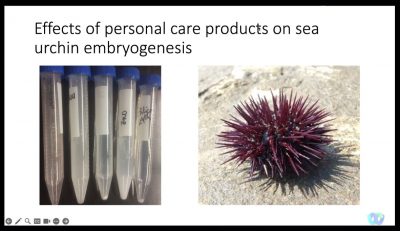
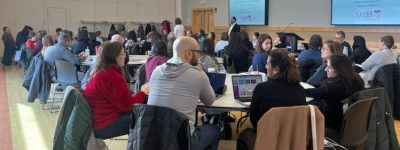 UConn ECE Faculty Coordinators from Spanish, Profs. Gustavo Nanclares and Eduardo Urios-Aparisi met with more than 60 Spanish Instructors to listen to Prof. Maria Acosta Cruz, Professor of Spanish in the Language, Literature & Culture Dept at Clark University. Prof. Acosta shared her talk “Ecocrítica, cultura y nación: La cultura puertorriqueña a través de cinco siglos” (“Ecocriticism, Culture, and Nation: Puerto Rican Culture Through Five Centuries”) with the teachers.
UConn ECE Faculty Coordinators from Spanish, Profs. Gustavo Nanclares and Eduardo Urios-Aparisi met with more than 60 Spanish Instructors to listen to Prof. Maria Acosta Cruz, Professor of Spanish in the Language, Literature & Culture Dept at Clark University. Prof. Acosta shared her talk “Ecocrítica, cultura y nación: La cultura puertorriqueña a través de cinco siglos” (“Ecocriticism, Culture, and Nation: Puerto Rican Culture Through Five Centuries”) with the teachers.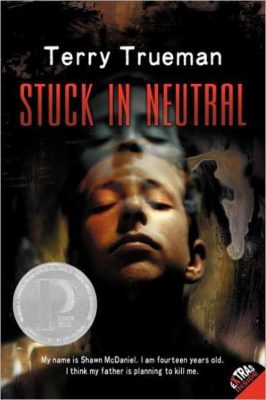
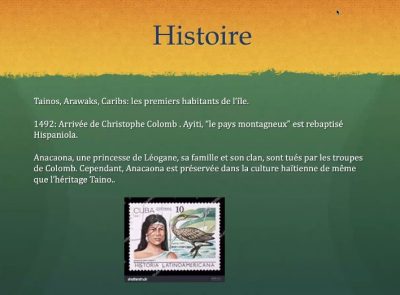 UConn ECE Faculty Coordinator from French, Prof. Florence Marsal met with 30 UConn ECE certified French Instructors to hear from Joëlle Vitiello, Professor of French and Francophone Studies at Macalester College for her talk “Enseigner les trésors d’Haïti” (“Teaching the Treasures of Haiti”). In addition, Mary Catherine Decoteau, Career Consultant from UConn’s Career Services, spoke to teachers about enhancing and highlighting career competencies in UConn French courses.
UConn ECE Faculty Coordinator from French, Prof. Florence Marsal met with 30 UConn ECE certified French Instructors to hear from Joëlle Vitiello, Professor of French and Francophone Studies at Macalester College for her talk “Enseigner les trésors d’Haïti” (“Teaching the Treasures of Haiti”). In addition, Mary Catherine Decoteau, Career Consultant from UConn’s Career Services, spoke to teachers about enhancing and highlighting career competencies in UConn French courses.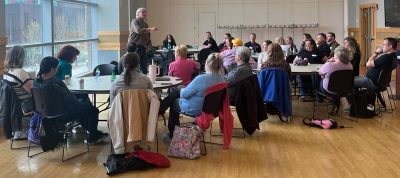
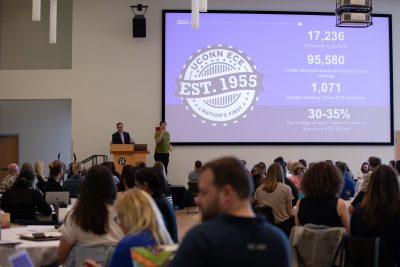
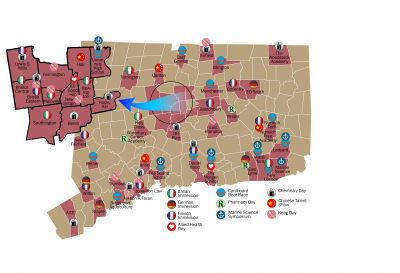
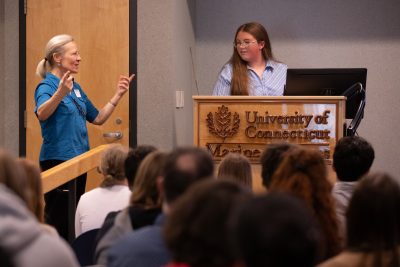
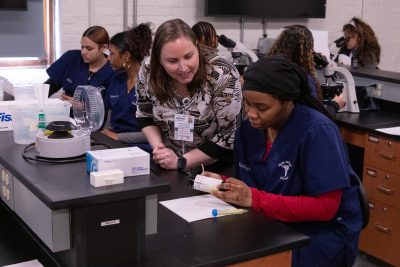
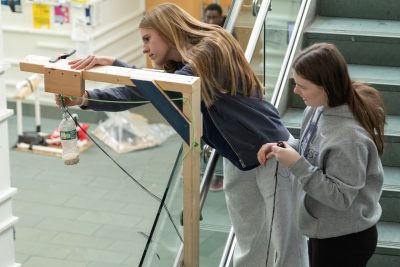
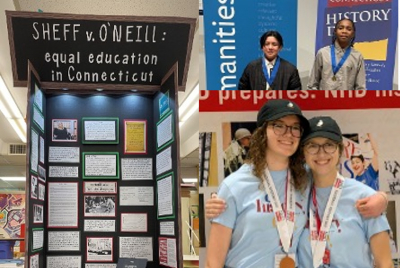

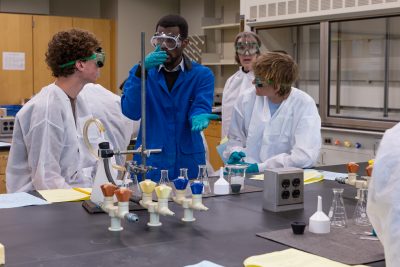

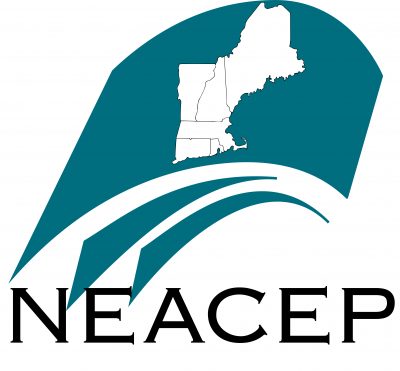 The University of Connecticut Early College Experience Program hosted the 2024 New England Alliance of Concurrent Enrollment Partnerships (NEACEP) annual conference on Friday, May 17, 2024 in the UConn Student Union. Approximately one-hundred dual/ concurrent enrollment and early college professionals and advocates from Connecticut, Maine, Massachusetts, New Hampshire, Rhode Island, Vermont, as well as several experts from outside of New England were in attendance. The event was kicked off by a warm welcome by Kari Suderley, NEACEP President/ Director of Early College Programs, University of Maine and Dr. Amit Savkar, Interim Associate Vice Provost CETL, University of Connecticut.
The University of Connecticut Early College Experience Program hosted the 2024 New England Alliance of Concurrent Enrollment Partnerships (NEACEP) annual conference on Friday, May 17, 2024 in the UConn Student Union. Approximately one-hundred dual/ concurrent enrollment and early college professionals and advocates from Connecticut, Maine, Massachusetts, New Hampshire, Rhode Island, Vermont, as well as several experts from outside of New England were in attendance. The event was kicked off by a warm welcome by Kari Suderley, NEACEP President/ Director of Early College Programs, University of Maine and Dr. Amit Savkar, Interim Associate Vice Provost CETL, University of Connecticut.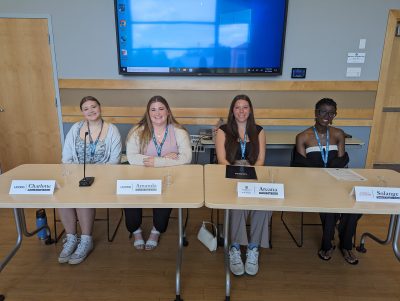 stakeholder perspectives on research, alumni insights, collaborative initiatives for improving early college access, and disrupting racist systems to promote student success. Sessions also delved into advanced course patterns, educator pathways, dual enrollment policies, diverse learning landscapes, career pathways advising, support for multilingual students, recognition in early college programs, targeted support for trade occupations, and a comprehensive look at Connecticut State Community College’s early college programs. The conference concluded with closing remarks from Kari Suderley, door prizes, and the distribution of certificates. Participants left with valuable insights and a growing network of connections in the field.
stakeholder perspectives on research, alumni insights, collaborative initiatives for improving early college access, and disrupting racist systems to promote student success. Sessions also delved into advanced course patterns, educator pathways, dual enrollment policies, diverse learning landscapes, career pathways advising, support for multilingual students, recognition in early college programs, targeted support for trade occupations, and a comprehensive look at Connecticut State Community College’s early college programs. The conference concluded with closing remarks from Kari Suderley, door prizes, and the distribution of certificates. Participants left with valuable insights and a growing network of connections in the field.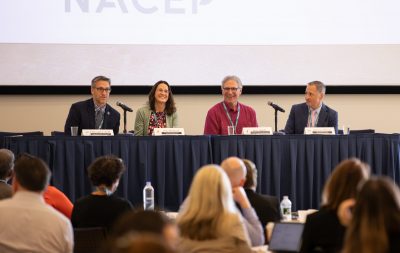
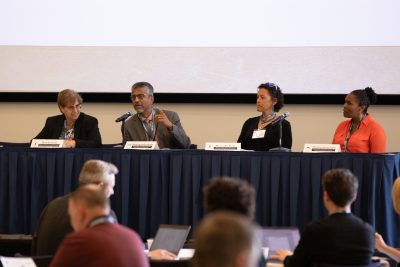
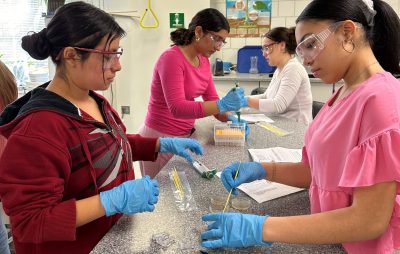


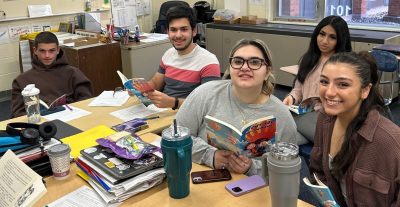
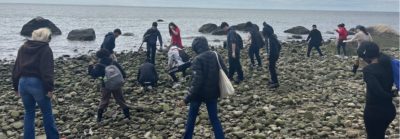
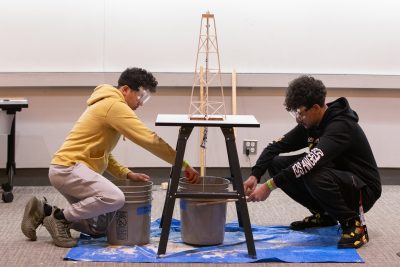 rs.
rs.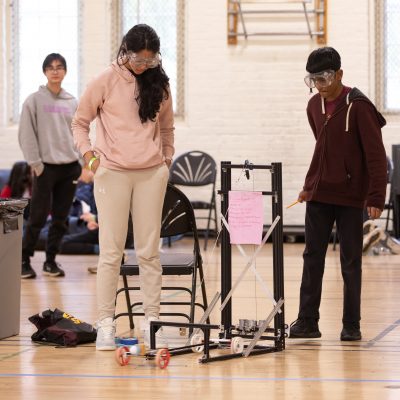
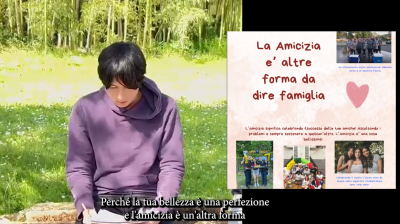
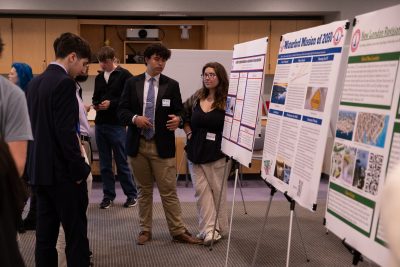 Claudia Koerting, UConn ECE Marine Science Faculty Coordinator, organized and led the event as she has for the past 10 years with the goal of extending student learning outside of the classroom and building relationships between students, instructors, and UConn faculty. This end-of-year event celebrates the academic achievements of the students throughout their UConn Marine Sciences courses taken through UConn ECE and exposes them to the UConn Avery Point faculty and facilities.
Claudia Koerting, UConn ECE Marine Science Faculty Coordinator, organized and led the event as she has for the past 10 years with the goal of extending student learning outside of the classroom and building relationships between students, instructors, and UConn faculty. This end-of-year event celebrates the academic achievements of the students throughout their UConn Marine Sciences courses taken through UConn ECE and exposes them to the UConn Avery Point faculty and facilities.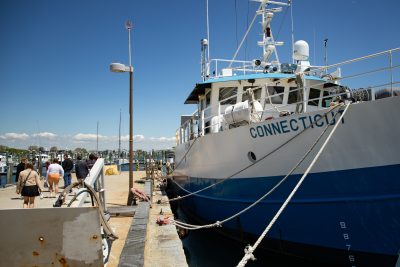 sonal research and life as a UConn student, and then took to the campus in the afternoon to explore.
sonal research and life as a UConn student, and then took to the campus in the afternoon to explore.
 s from students at the Mansfield Regional Contest:
s from students at the Mansfield Regional Contest: 